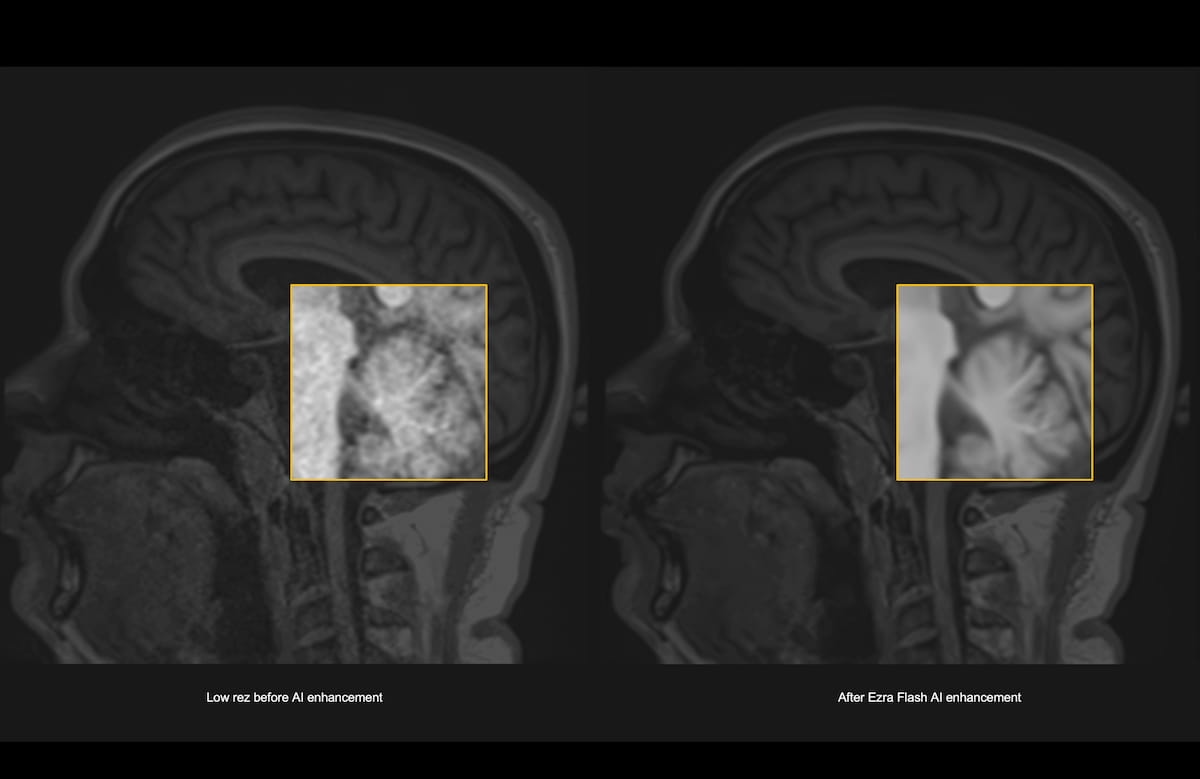FDA Clears AI Software That May Lead to 30-Minute Full-Body MRI Exams
The artificial intelligence (AI)-powered Ezra Flash reportedly enhances magnetic resonance imaging (MRI) and enables significant reductions in scan times and costs for full-body MRI.
Could 30-minute full-body magnetic resonance imaging (MRI) exams be a reality in the near future?
The Food and Drug Administration (FDA) has granted 510(k) clearance for Ezra Flash (Ezra), an artificial intelligence-enabled software that enhances the quality of images derived from a fast MRI protocol, according to Ezra, the developer of the software.
Emphasizing that Ezra Flash was trained on hundreds of thousands of MRI scans from a proprietary dataset, Ezra said the technology facilitates simultaneous image quality and scan time reduction to the point where it can reduce the costs of full-body MRI by 30 percent.
Here one can see imaging prior to (left) and after the use of Ezra Flash (right). (Images courtesy of Ezra.)

Noting that Ezra Flash has received FDA clearance for brain imaging, the company plans to utilize the technology to launch the first 30-minute full-body MRI.
Possibly facilitating proactive cancer detection for a broader patient base beyond those with established risk factors, the FDA clearance of Ezra Flash may represent the “ … beginning of a sea change in how medical imaging is used,” noted Daniel K. Sodickson, M.D., Ph.D., the chief of innovation and director of the Center for Advanced Imaging Innovation and research in the Department of Radiology at New York University (NYU).
“Ezra Flash will increase the accessibility of early-warning MRI, and Ezra’s dataset of repeated scans over time will help it to prevent false positives and ensure that the warnings it provides are appropriate and accurate,” emphasized Dr. Sodickson.
(Editor’s note: For related content, see “Can Alternative MRI Techniques Help Enhance CyberKnife Treatment Imaging?”)
Considering Breast- and Lesion-Level Assessments with Mammography AI: What New Research Reveals
June 27th 2025While there was a decline of AUC for mammography AI software from breast-level assessments to lesion-level evaluation, the authors of a new study, involving 1,200 women, found that AI offered over a seven percent higher AUC for lesion-level interpretation in comparison to unassisted expert readers.
FDA Clears Virtually Helium-Free 1.5T MRI System from Siemens Healthineers
June 26th 2025Offering a cost- and resource-saving DryCool magnet technology, the Magnetom Flow.Ace MRI system reportedly requires 0.7 liters of liquid helium for cooling over the lifetime of the device in contrast to over 1,000 liters commonly utilized with conventional MRI platforms.